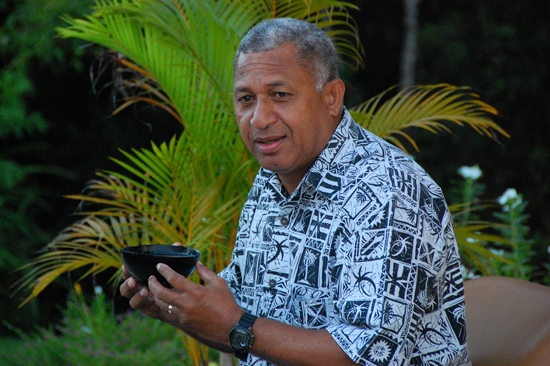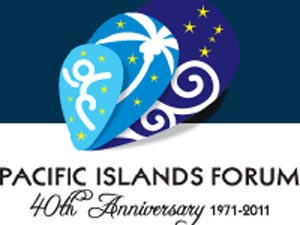
ANALYSIS: A uniquely large number of world leaders are joining New Zealand’s John Key and Australia’s Julia Gillard at the Pacific Islands Forum summit that starts in Auckland ON Wednesday, but it is the figure who is banned from attending — Fiji’s military ruler Commodore Voreqe Bainimarama — who may cast the longest shadow over the meeting.
Such summits usually test the mettle of Australian and New Zealand leaders since so much weighs on how the dominant powers operate in the region. But this year, Australia’s aims for the meeting are modest, so the Prime Minister may be able to use the forum as a place where she can regroup after her disastrous past month.
But this year, Australia’s aims for the meeting are modest, so the Prime Minister may be able to use the forum as a place where she can regroup after her disastrous past month.
Asylum-seekers are unlikely to make the agenda, unless Gillard chooses self-laceratingly to place the issue there.
The meeting, marking the forum’s 40th anniversary, will be chaired by New Zealand’s popular Prime Minister John Key, with NZ continuing to chair the organisation through the next year.
Given the close co-operation between Canberra and Wellington, especially on Pacific issues, that in itself takes some pressure off Gillard to take a frontline role this week.
Fiji’s political clout
But for Australia and NZ, one big challenge will have to be managed, on which failure would compound the sense that Gillard can’t take a trick: Fiji.
Bainimarama organised a meeting in Nadi last week to rally support among island leaders and to demonstrate that although Fiji has been suspended from the Forum, as from the Commonwealth – because of its government’s refusal to countenance elections for another three years, it remains the hub of the Pacific and has considerable political clout.
The prime ministers of Papua New Guinea, Solomon Islands and Tuvalu attended, as did the foreign ministers of Nauru and East Timor — though the latter is not a forum member — and ministers or other representatives from five more forum countries.
They discussed a plan to build a regional police training centre in Fiji. Its progress, and its potential sponsors — including possibly China — will be watched closely by Canberra.
They also agreed on a statement backing the need for “widely publicising . . . progress being made in Fiji towards sustainable economic development and credible and inclusive democracy”.
Whether this will translate into a move to restore Fiji to full membership of the forum will soon be known. Solomon Islands Foreign Minister Peter Shanel Agovaka said in Nadi Fiji’s inclusion would be a major issue for leaders.
Bainimarama’s crusade to marginalise the Forum would have been unthinkable in the era dominated by the two great leaders of independence in the Pacific – Fiji’s Kamisese Mara, who died in 2004 aged 83, and PNG’s grand chief, Michael Somare, aged 75, who is almost certain to retire during the next year following a succession of serious operations in Singapore.
Not so special
For both leaders, the Forum, still based in Suva, was an international body which they viewed as their own creation. Its traditions and its island style validated their approach to leadership. But the newer generation of leaders does not see it as quite so special.
It is doubly fortunate, then, that this year’s summit will be held in Auckland, the city that contains the world’s highest Polynesian population, and where the Rugby World Cup kicks off on Friday with a game between the hosts, the All Blacks, and Tonga.
And past form shows that despite the applause Bainimarama wrings from island leaders in Fiji, they are reluctant to expend political capital on pushing his interests at larger international gatherings, especially at a meeting of the Forum that features several new leaders stepping up to the international stage for the first time.
One associated test will emerge over the fate of Samoan Tuiloma Neroni Slade, the forum’s Secretary-General, whose term ends in the year ahead. The group who joined Bainimarama in Nadi agreed to demand Slade’s removal — denying him a second term — and his replacement by former Fiji foreign minister Kaliopate Tavola. But his application has sought to circumvent the usual process.
The forum this year is attracting UN Secretary-General Ban Ki-moon, European Commission President Jose Manuel Barroso, Indonesian Foreign Minister Marty Natalegawa, French Foreign Minister Alain Juppe, US Deputy Secretary of State Thomas Nides, and senior representatives of Hungary, Slovenia, Luxembourg, Spain, Finland, Kyrgyzstan and Bhutan.
The latter countries are coming to lobby for seats on the UN Security Council for different terms, including competitors with Australia for the term starting in 2013. Fiji has been campaigning strongly, at regional meetings and in New York, for Luxembourg instead of Australia.
NZ is planning for a forum focused on the positives, encapsulated in the cliche “sustainable economic development”. It is opening the forum processes as never before, to businesspeople to participate.
Coordinating aid goals
Ban and Barroso handily will both spend time in Australia before Auckland, and so will be well schooled in Canberra’s take on issues — chiefly, on the need to co-ordinate aid goals and delivery — before they arrive.
Canberra has sought for a few years to persuade the UN’s top administrator to come to the forum and is especially keen to persuade Ban to commit more resources to helping island countries adjust to climate change.
A free trade agreement between Pacific island countries and the EU, which gives the islands $68 million a year in aid, is in the early stages of discussion.
The extension of the Pacific Agreement on Closer Economic Relations — a multilateral free trade deal — from the 14 Forum island countries, who have a loose arrangement in place, to include Australia and NZ, has attracted some controversy, with critics of trade liberalisation claiming Australia has sought to hijack the process.
But progress towards PACER Plus remains glacial, so no significant decision on the issue is sought in Auckland. And Canberra insists its share of funding of a trade adviser for the island countries is on course.
Jenny Hayward-Jones, director of the Lowy Institute’s Melanesia Programme, says given changes in regional leadership, “the only reliable point of continuity [in Auckland] is Samoa’s Prime Minster Tuilaepa Sa’ilele Malielegaoi, who is outspoken about events in Fiji [as a critic of Bainimarama] and is committed to the agenda of the forum”.
She adds: “The apparent lack of interest from Australia’s Trade Minister in PACER Plus is worrying, as a strong commitment to action from Australia is essential to the progress of negotiations.”
Seasonal worker scheme
Hayward-Jones thinks Pacific Island countries will likely put pressure on Australia at the forum to explain why the Australian seasonal worker scheme is not delivering on its promise. This issue will attract renewed interest because new PNG Prime Minister Peter O’Neill has offered access to workers from smaller Pacific countries to the enormous construction and resource projects getting under way in PNG.
Hayward-Jones says the debt distress of some countries, notably Tonga and Cook Islands — which has in part been caused by an over-reliance on soft loans from China — may be raised.
But, she adds, Fiji is “the proverbial elephant in the room. Bainimarama’s actions show he continues to take no notice of the forum or pressures from abroad to relax Fiji’s Public Emergency Regulation or make any credible move towards elections.”
And some island countries exhibit a split personality on the issue.
Satish Chand, an expert in development economics at the University of NSW, based at the Australian Defence Force Academy, says: “The fact the Forum is alive and well 40 years after its creation is a mark of success. However, it is time this regional body carried out a stocktake of its achievements.”
Three pressing initiatives require political backing in Auckland, he says: labour market integration, management of the Pacific Ocean including innovative seabed mining, and climate change.
Professor Stewart Firth, from the Australian National University’s Melanesia programme, says China’s influence is growing in the Pacific, “strengthened by its truce with Taiwan over competitive aid-giving”.
“In response, the US has rediscovered the South Pacific. The American aid programme to the region has resumed after a break of 16 years . . . And [the US] seems to be losing faith in Australia and New Zealand’s ability to maintain its interests in the region.”
Influence in the islands is being contested, he says, with the United Arab Emirates announcing a $US50m ($47m) aid program, in an area “where it appeared to have no obvious interests”.
Sub-regionalism is also growing, Firth says, with the Melanesian Spearhead Group now giving expression via its chairman, Bainimarama, to “a sense of Melanesian solidarity that is in part directed against Australia”.
Firth adds the forum may not be as central to Pacific islands’ concerns and to regional co-operation as Australia would like it to be, and perhaps imagines it is.
Gillard, though, has up her sleeve an especially attractive tool for maintaining Australia’s influence in the region: a bipartisan political deal to double foreign aid to $8 billion a year or more from 2015, with a big slice of it earmarked for the Pacific.
Reprinted from The Australian with the permission of the author.



